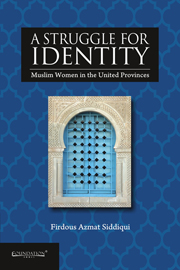Book contents
- Frontmatter
- Contents
- Acknowledgements
- Introduction
- 1 Social Stratification of Muslim Women in the United Provinces
- 2 Socio-religious Movement and the Muslim Women's Issue
- 3 British Perception of Muslim Women: Questions of Fecundity and Health
- 4 Crises in the Social and Economic Identity of Muslim Women: The Great Uprising of 1857
- 5 Changing Profile of Muslim Women through Education
- 6 Patriarchy and Social Obligation of Indian Muslim Women
- 7 Cultural Clash: From Tawaif to Kasbi
- 8 Law, Land and Muslim Women: The Economic Situation
- 9 Muslim Women's Response to the New Judicial System
- Conclusion
- Glossary
- Bibliography
- Index
7 - Cultural Clash: From Tawaif to Kasbi
Published online by Cambridge University Press: 05 October 2014
- Frontmatter
- Contents
- Acknowledgements
- Introduction
- 1 Social Stratification of Muslim Women in the United Provinces
- 2 Socio-religious Movement and the Muslim Women's Issue
- 3 British Perception of Muslim Women: Questions of Fecundity and Health
- 4 Crises in the Social and Economic Identity of Muslim Women: The Great Uprising of 1857
- 5 Changing Profile of Muslim Women through Education
- 6 Patriarchy and Social Obligation of Indian Muslim Women
- 7 Cultural Clash: From Tawaif to Kasbi
- 8 Law, Land and Muslim Women: The Economic Situation
- 9 Muslim Women's Response to the New Judicial System
- Conclusion
- Glossary
- Bibliography
- Index
Summary
Pahle dil lete hai voh ya pahle jan ahle dard
Dekhie karte hain keunkar imtehan ahle dard
Kaun kahta hai nahi hai qadardan ahle dard
Dard dil dag jigar hai meharban ahle dard
Ranj va gham dard va alam aah va Fagaan va qurb va qalaq
Ajkal to hain yahi bas meharban ahle dard
Dono hathon se kaleja tham ke baithen huzoor
Shauq sunne ka agar hai dastan ahle dard
Qissa ranj va alam sun-sun kar ro dega har ek
Zikr jab saaqi ka hoga darmayan ahle dard
Sitari Jan Saqin Tawa'if Saqin Baska Jila GhazipurWould my friends take first my heart or my life
Let's see what tests they put me through, what strife
Who can ever claim they care not for me
They inflict sufferings on my heart, scars on my soul
Grief, sorrows, pains, sufferings, cravings and yearnings,
These alone are my friends these days, my companions
My friend! hold your heart with both your hands
If you are inclined to hear the tale of my afflictions
These tales of woes would bring tears into every eye
Whenever the mention of saqi would be made in midst of friends.
(Tr. into English by Nishat Zaidi)This is not merely a verse; it symbolises the pain of the dying culture of the tawa'if. Etymologically, tawa'if is the plural of the Arabic word taifa, meaning ‘band’ or ‘group’ but the word tawa'if, used as a singular in Urdu, means ‘prostitute’. The common and derogatory word for prostitute in Urdu is ‘randi’. There are different types of tawa’ifs: those who were ‘kept’ on a permanent basis by a man and might eventually have married him, and those who led an itinerant life, moving from city to city. In some cities, especially Lucknow, the tawa’if occupied a relatively respectable position in society and was admired for her sophistication and culture. The elite of the town would send their sons to the tawa’if’s residence to be educated in manners and letters.
- Type
- Chapter
- Information
- A Struggle for IdentityMuslim Women in United Provinces, pp. 155 - 179Publisher: Foundation BooksPrint publication year: 2014

